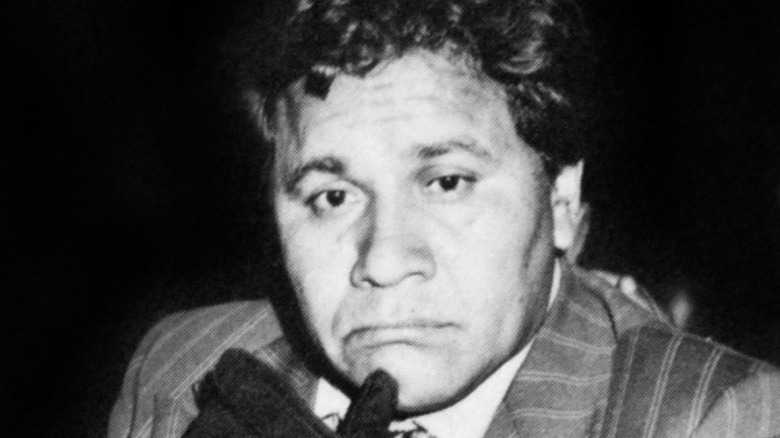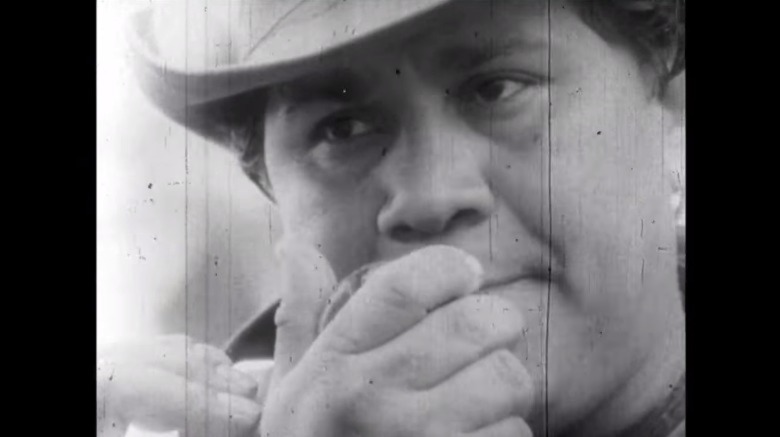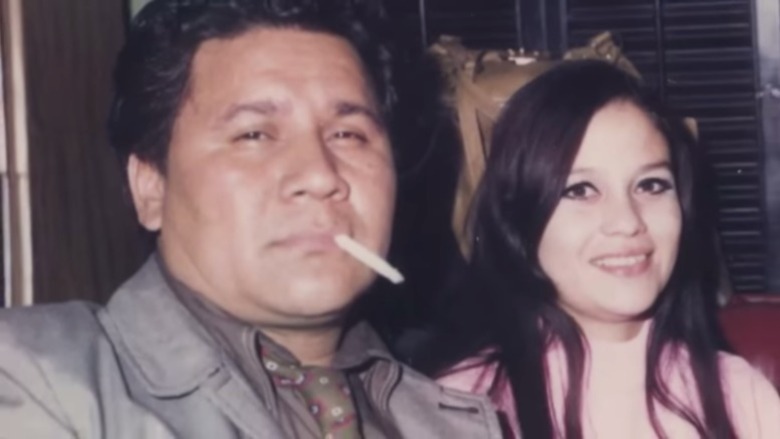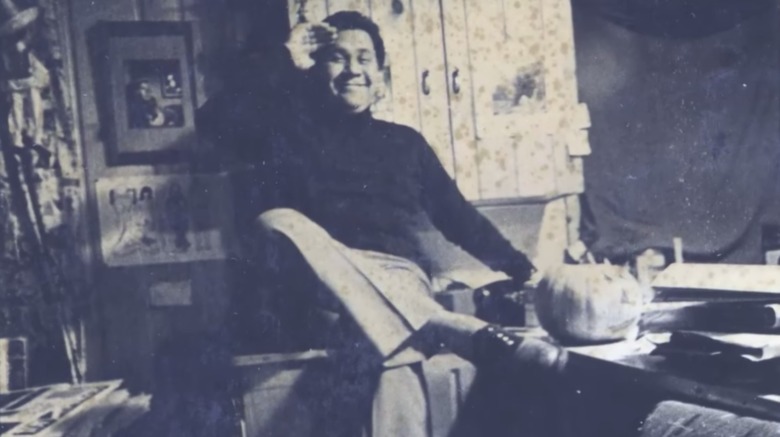The Mysterious Disappearance Of Oscar Zeta Acosta
"Too weird to live, and too rare to die." This quote from gonzo journalist Hunter S. Thompson, the great friend of Oscar "Zeta" Acosta who immortalized him as his sidekick and attorney, "Dr. Gonzo," in the 1971 novel Fear and Loathing in Las Vegas, has grown to be uncannily apposite in the decades since Acosta disappeared without a trace in 1974. A legend in his own lifetime, the legacy of Acosta has remained in a liminal state ever since, with the mystery of his disappearance hanging like a gray cloud over his life as an activist and writer whose exploits perhaps deserve greater examination than that which has thus far been afforded his admittedly recognizable caricature in Thompson's cult novel — as a recent documentary attests.
The LA Times describes Acosta "as an ambitious, hard-working man" originally from El Paso, Texas, and brought up in California, whose first love was creative writing, which he studied at university level before setting his sights on passing the bar and enrolling at San Francisco Law School. After graduation, he worked at the East Oakland Legal Aid Society, where, among other menial work, he began to scheme of how best to use his newly gained legal skills to achieve true social justice.
Oscar Zeta Acosta: Chicano activist
After passing the bar exam and becoming a qualified barrister, Oscar Zeta Acosta "was introduced to a nascent movement embracing the new cultural and political categorization of 'Chicano,'" according to L.A. Taco. Originating in the 1960s, the Chicano movement — the name of which is derived from the reclamation of an anti-Mexican-American slur — fought to celebrate and make visible Mexican-American identity on its own terms. "Instead of only recognizing their Spanish or European background, Chicanos now also celebrated their Indigenous and African roots," according to History, while activists also worked to fight oppression and prejudice in society, the world of work, and the American legal system.
Acosta, who was by all accounts a highly intelligent and charming presence, became instrumental in bringing greater attention to the Chicano movement through speeches at rallies. He also used his legal abilities in high-profile cases, such as that of the Eastside 13, who in 1968 faced 666 years in jail between them for their roles in the East L.A. "blowouts," a huge student walkout of Mexican Americans to "demand better education," per the Los Angeles Times. According to organizer David Sanchez, Acosta was working as a waiter in Aspen when he saw footage of the protesters fighting with police. "Oscar said he took off his apron, threw it down on a table and announced, 'Those people need a lawyer!' Then he drove to L.A.," per the same source.
Oscar Zeta Acosta was beginning a writing career
The specter of what might have been if Oscar Zeta Acosta had continued to be a force for good into middle age and beyond — he was just 39 when he went missing — is always close by in discussing the Chicano hero. "There was such potential in that man," states Ann Henry (portrayed by Christa Haxthausen) in the trailer for The Rise and Fall of the Brown Buffalo, a documentary about his life, which also describes Acosta "one of his generation's most forceful critics of white supremacy."
Things changed for Acosta after his portrayal in Fear and Loathing in Las Vegas. Though the book centers around Acosta's hedonistic tendencies, his friendship with Hunter S. Thompson is also a reminder that his first love, before law, was literature, and it was to this he returned after being reinvented — somewhat against his will — as a cult icon. Fear and Loathing erased Acosta's racial identity, describing him as a "300-pound Samoan." As reported in L.A. Taco, Acosta threatened to sue and used the legal wrangle to leverage himself a book deal with Thompson's publisher. "Whenever he set out to do something, he went at it full force," Acosta's son, Marco, told the Los Angeles Times. Acosta quickly released two books featuring the Chicano movement and Mexican American identity as major themes: Autobiography of a Brown Buffalo and The Revolt of the Cockroach People, in 1972 and 1973, respectively, before he vanished a year later.
Oscar Zeta Acosta vanished without a trace
According to L.A. Taco, the last known person Oscar Zeta Acosta was in contact with was his son, whom he had telephoned to tell him he was in Sinaloa, Mexico. He was never heard from again. To this day, there has been no evidence of his fate, or any sign of whether he is alive or dead. His family now believes that the latter is more likely, though as gettingit.com writer Shermakaye Bass notes, they "don't speculate anymore. They simply accept that the messianic bison's fate remains one of the more schizoid mysteries of American subculture."
Because the truth is, speculation is all we have to go on, even though many theories have been forwarded over the years to explain Acosta's sad disappearance. In the 1977 article for Rolling Stone, "The Banshee Scream for Buffalo Meat" — from which the quote which opens this article is taken — Hunter S. Thompson takes it upon himself to hunt for his erstwhile friend, and like the recent Brown Buffalo documentary, Thompson suspects that Acosta may have been killed during a drug deal. "Drugs and alcohol consumed him," claims L.A. Taco, which has given rise to the theory that a mental breakdown might account for his disappearance but also suggests he may have been assassinated to neutralize his political power.
Acosta's disappearance remains uninvestigated by official channels to this day.



